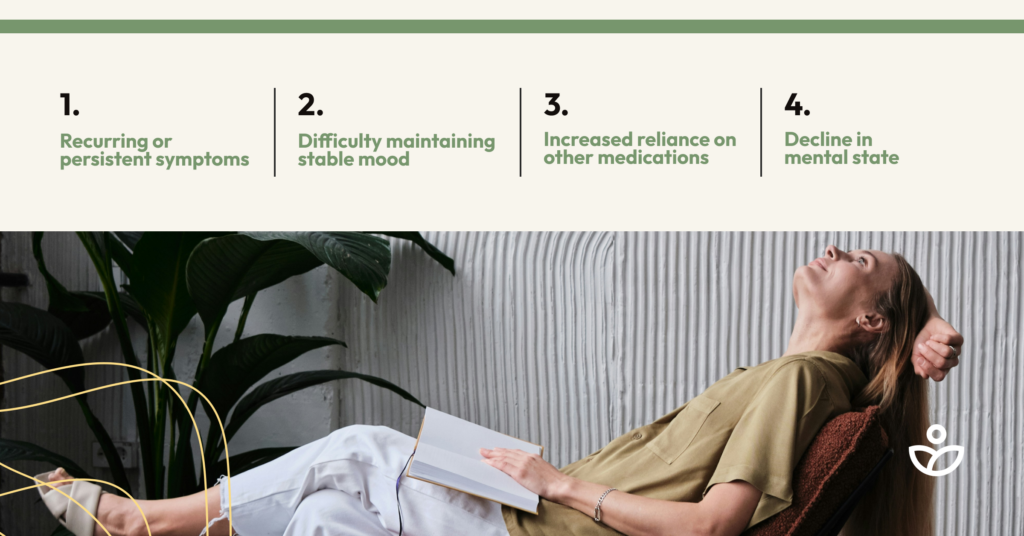Embarking on the path of ketamine treatment is more than just a quick fix; it is a continuous journey of healing and self-improvement. Opting for a ketamine booster treatment should not be seen as a sign of regression or failure. Instead, it underscores a commitment to maintaining mental wellness and bettering oneself. These supplementary sessions are designed to sustain and prolong the benefits achieved from initial treatments, ensuring that individuals continue to experience relief from symptoms and gain greater stability in their lives. Embracing ketamine boosters is a proactive step toward long-term mental health and a testament to one’s dedication to personal growth.
In this post, we’ll explore how to recognize when you might need a ketamine booster and the frequency of these treatments.
Signs You Need a Ketamine Booster Treatment
Knowing when to schedule a ketamine booster can make all the difference in sustaining your mental health progress. Here are the key signs to watch for:
1. Recurring or Persistent Symptoms
If feelings of depression, anxiety, or other mental health symptoms that were alleviated by your initial ketamine treatments begin to return, it may be time for a ketamine booster. Retake the symptom evaluation you were provided during your initial series to gauge any changes in your depression or anxiety scores.
2. Difficulty Maintaining Stable Mood
Struggling to keep a consistent emotional balance or experiencing mood swings could indicate that the effects of your initial treatments are wearing off. A ketamine booster can help restore emotional stability.
3. Increased Reliance on Other Medications or Therapies
If you find yourself leaning more heavily on other mental health treatments or medications, it may suggest that a ketamine booster could better support your ongoing progress.
4. Mental State Decline
Trust your instincts. If you feel less mentally well or notice a decline in your overall mental state compared to immediately after your initial ketamine treatments, this is a strong indication that a ketamine booster might be beneficial.
By identifying these signs, you can proactively manage your mental health and ensure you’re staying on track with your healing journey.

Frequency of Ketamine Booster Treatments
The frequency of ketamine booster treatments varies depending on individual needs and responses. While some patients benefit from boosters every three to six months, many at Anew Therapy report the greatest results with a ketamine booster every six to eight months after completing their ketamine therapy series. Your personal schedule should be guided by your mental health progress, life events, and consultation with your healthcare provider.
Being attuned to your unique mental health patterns will help determine how often a ketamine booster is necessary to maintain symptom relief and emotional stability.
How Ketamine Boosters Support Long-Term Healing
Ketamine booster treatments are more than just maintenance; they’re an integral part of a proactive approach to mental health. By reinforcing the neuroplasticity benefits of your initial treatments, boosters help sustain the changes in your brain that support symptom relief and emotional stability. Here are some of the key benefits of ketamine boosters:
- Single Treatment, Same Relief: Even a single booster session can provide the same level of symptom relief as your original series.
- On-Demand Availability: Boosters are available as needed, giving you the flexibility to address your symptoms when they arise.
- Personalized Care: Each booster session is customized to your current needs, ensuring you continue to make progress on your healing journey.
Why Choose Anew Therapy for Ketamine Booster Treatments?

At Anew Therapy Utah, we understand that healing is an ongoing process. That’s why we offer ketamine booster treatments to help you maintain the benefits of your initial ketamine therapy. Here’s what you need to know about receiving a ketamine booster with us:
- Cost: $400 per booster treatment. These single treatments offer the same level of relief as your initial sessions.
- Eligibility: Booster treatments are available after completing your ketamine therapy series. Both returning and new patients can receive ketamine boosters at Anew Therapy, but new patients must start with an evaluation before getting their first booster.
- Timing: Most patients find they need a ketamine booster 6-8 months after completing their initial series. However, boosters are available as needed to address symptoms that resurface sooner.
- Customizable: Our treatments are tailored to meet your unique needs, ensuring you receive the most effective care.
- Convenience: Ketamine booster treatments are HSA-eligible, making it easier to integrate them into your healthcare plan.
At Anew Therapy, we prioritize your ongoing mental health by providing accessible and effective ketamine booster treatments. Whether you’re a returning patient or new to our practice, our team is here to guide you through the process:
- Returning Patients: If you’ve already completed your ketamine series with us, scheduling a booster is easy and ensures continuity of care.
- New Patients: We welcome new patients who have completed a ketamine series elsewhere. An initial evaluation will help us tailor your ketamine booster treatment to your needs.
Sustaining Your Mental Wellness
Being proactive about your mental health is key to maintaining the benefits of your initial ketamine treatments. By paying attention to the signs and symptoms mentioned above, you can better determine when it’s time for a ketamine booster treatment. At Anew Therapy Utah, we’re here to support you every step of the way, offering affordable, flexible, and effective booster options to help you sustain relief and stability.
If you believe you might benefit from a ketamine booster treatment, don’t hesitate to reach out to us. Together, we’ll create a plan that ensures you continue to experience the relief and stability you deserve.
Searching for the best ketamine clinic in Utah? Anew Therapy offers expert care and proven results. Schedule your free intake appointment today.

